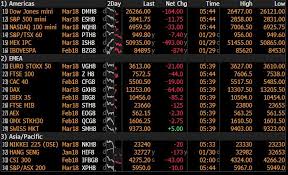Asian shares slide as Sino-U.S. spat on Hong Kong clouds trade deal outlook

Global shares slid on Thursday as a fresh row between Washington and Beijing over U.S. bills on Hong Kong could complicate their trade negotiation and delay a “phase one” deal that investors had initially hoped to be inked by now.
MSCI’s broadest index of Asia-Pacific shares outside Japan .MIAPJ0000PUS fell 0.16% while Japan’s Nikkei .N225 dropped 0.25%.
U.S. S&P500 futures ESc1 dropped 0.2% in early Asian trade, a day after MSCI’s broadest gauge of world stocks fell 0.4%, the biggest fall since early October.
On Wall Street, all three major indexes fell, with the S&P 500 .SPX losing 0.38%.
The U.S. House of Representatives on Wednesday passed two bills intended to support protesters in Hong Kong and send a warning to China about human rights.
The legislation, which has angered Beijing, has been sent to the White House for President Donald Trump to sign or veto amid delicate trade talks with Beijing.
Trump is expected to sign the legislation, a person familiar with the matter said on Wednesday.
Even if he vetoes, that would be difficult to sustain given that the measures passed both the Republican-controlled Senate and Democratic-controlled House with almost no objections.
“China will surely take this as an interference into its domestic affairs and is likely to think it will no longer need to make concessions on trade,” said Norihiro Fujito, chief investment strategist at Mitsubishi UFJ Morgan Stanley Securities.
Trade experts and people close to the White House said completion of a “phase one” U.S.-China trade deal could slide into next year, as Beijing presses for more extensive tariff rollbacks, and the Trump administration counters with heightened demands of its own.
Trump said on Oct. 11 that deal could take as long as five weeks, and investors had initially expected a deal by mid-November.
Asked Wednesday about the status of the China deal, Trump told reporters in Texas: “I don’t think they’re stepping up to the level that I want.”
Trade jitters sent the 10-year U.S. Treasuries yield down to 1.747% US10YT=RR, near its lowest levels in three weeks and down more than 20 basis points from a Nov. 7 peak of 1.973%, a three-month high.
Similarly in the currency market the yuan hit a three-week low of 7.05 per dollar in offshore trade on Wednesday and last stood at 7.045 yuan per dollar CNH=, down about 0.09% in early Asian trade.
The dollar slipped against the yen to 108.46 JPY=, compared to this week’s high of 109.07 touched on Monday, while safe-haven gold edged up 0.18% to $ 1,473.6 per ounce XAU=.
The euro was little changed at $ 1.1075 EUR=.
The minutes from the Federal Reserve’s previous policy meeting offered little guidance on what would cause policymakers to change their minds on the outlook after an increasingly divided Fed decided to hit pause in its easing cycle.
Oil prices held firm having surged more than 2% on Wednesday after a better-than-expected U.S. crude inventories report and as Russia said it would continue its cooperation with OPEC to keep the market balanced.
U.S. West Texas Intermediate (WTI) crude futures CLc1 were down 0.18% at $ 56.91 per barrel in early Thursday trade.


